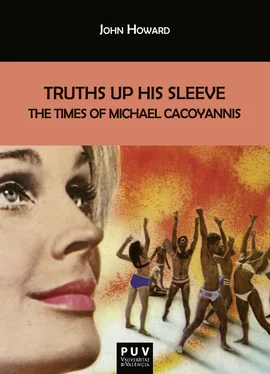The widely reproduced image of Dietrich smoking a cigarette, cross-dressed in top hat and tuxedo with pearl studs, jeweled cufflinks, and cummerbund, is perhaps the same photo blown-up on the poster Michael autographed and pinned to his wall. When his “terribly conservative” father bothered to look in on the boys, he reacted with alarm and reiterated the need for masculine pursuits. Yet in all-male team sports or contact sports, Michael was unsuccessful. In individual athletic competition such as tennis, he was more at ease. He enjoyed swimming but prefered dancing. By the time Michael reached his teens, family members went on holiday most summers to Platres, a mountain resort a couple of hours north by car, a cool retreat from Limassol’s July and August heat. Platres hotels held a “pervasive charm and exoticism [with] many foreign” guests. When he was fourteen years old, Michael’s mother instructed a tailor to make “my first tuxedo,” much like Dietrich’s, “and I wore it while attending afternoon tea dances. We usually danced tango. I was good, but a friend of mine, Nikos, a good-looking beauty, was best.” 22
If Michael learned to read in part with silent film intertitles, he acquired distinctive visual and sartorial acumen by virtue of motion pictures and their still photographs—the headshots, half-shots, and group portraits that filled film fan magazines. These images formed an alternative iconography to the traditional family portraits kept in frames and photo albums by Michael’s mother and grandmother. As Michael made clear, Garbo and Dietrich enlivened his daydreams, as they featured on the covers and pages of Motion Picture (US), Vu (France), and BIZ (Germany), available at newsstands or peripteros on Limassol street corners and promenades. From these magazines and others, he lovingly cut out Garbo and Dietrich’s images and affixed them alongside his bed, even as the magazines compared the actors’ attributes. Features such as Leonard Hall’s “Garbo vs. Dietrich” in Photoplay declared “battle” between “the charms and talents of Paramount’s rising star and the goddess of MGM’s studio.” Thanks to the bilingual Cacoyannis household and thanks to the Greek Gymnasium, where first-graders were taught Greek and English in equal measure, Michael had no difficulty reading the salacious stories of Hollywood gossip. From second-grade, French also was taught, just as Parisian (and local) cabarets began to figure prominently in Michael’s imagination. For Michael and Stella, multilingualism was tied to movie-going, as silent films in French, Greek, and English and talkies in Greek, English, and other languages were screened across the street and around Limassol. 23
Moreover, pre-Code pictures in particular offered sustained views of lives lived against the grain of middle-class respectability and sexual normativity. At Morocco’s end, Dietrich’s unmarried but experienced Amy chooses to pursue her French Foreign Legion lover, played by Gary Cooper. Suspending her stage career for the moment, Amy sets off into the desert, in the company of other industrious women, the band of nonwhite north African sex workers who follow the fighters into combat zones. Oddly enough, Hollywood depictions of northern European stars in Mediterranean climes also taught Michael an important lesson in social and physical mobility, applicable to Garbo and Dietrich’s on-and off-screen personas. To free yourself of traditional family values, you had to remove yourself from the family home and relocate. To move away was to move up—or, at least, to move toward a more flexible kinship network of race-mixers, gender-benders, and sexual libertines.
Four Siblings and an Outsider
In the unpublished autobiographical short story “Exterminating Leslie,” drafted and reworked over the 1980s and 1990s, Michael depicts Christmas season 1933 in Limassol, when a young visitor to the Cacoyannis household tests family allegiances and exposes regional taboos of race and sexuality. As the four siblings ostracize the newcomer with formulaic insults of ethnicity and paternity, as they even come to blows, Michael reconsiders his loyalty to family and locality, as he at last empathizes with a gangly boy of uncertain origins. The story shows Michael on the cusp of higher knowledge about the world’s structures of inequality. It signals one of many moments in which he becomes, in Sara Ahmed’s theorization, a willful child primed for the collective possibilities of adult dissent. 24
The only child of family friends, Leslie arrives as an exotic threat, mysteriously cut off from his parents who are abroad over the holidays. Left in the care of Michael’s mother, twelve-year-old Leslie is just a few months younger than Michael, but he is taller than “all the Greek boys in school” and a better dancer than Michael. A skinny, freckled redhead with a thin piping voice, Leslie is “terribly English-looking.” Resembling his father, Leslie nonetheless poses the predicament of mixed parentage—that is, biracial white/non-white coupling— which “precocious” ten-year-old Yannoulla criticizes with a racist verbal assault. “You are only half-English. Everybody knows your mother is an Egyptian”—an opera singer with a “thick accent.” Moreover, the story suggests, Leslie might be an “illegitimate” child or “bastard.” Thus does the elder author Michael examine his family’s complicity in Leslie’s childhood degradation. 25
The four Cacoyannis siblings are characterized as close but competitive to the point of antipathy. Eldest child Stella is bright, poised, and principled. She considers Michael’s scheming “terrible,” his “plots” and “machinations” always getting the children into trouble. Cunning, forever spying on their houseguest, Michael is “particularly touchy about his artistic talents,” regularly repairing to the piano to sound out proof of his abilities, from Strauss’ “Blue Danube Waltz” to Schubert’s “Serenade.” He also is self-conscious about his short stature, declaring that “most great men were short. Napoleon, for instance.” Highly observant of women’s makeup, Michael judges whether ladies are under-or “over-painted.” He has “a knack for making people laugh,” but given his fragile adolescent masculinity—and incipient internalized homophobia—he tries to make his voice lower and deeper. At ten, tomboy Yannoulla is a shameless money-grubber who weighs the relative value of gifts with precision. She can discern grades of gold from 14 to 18 to 24 karat, and she can determine whether items of jewelry are pure gold or gold plate on tin. Of the siblings’ godfathers, Yannoulla’s is “richest,” so she is “furious” over his “tacky” inexpensive Christmas present to her. Like eldest child Stella, baby brother George has a “sweet disposition.”
With “eyes soft and infinitely gentle,” Mama exercises skills of even-tempered persuasion over her clever children. Papa “always got back late from the office and didn’t want to be bothered with domestic problems,” apart from bad behavior warranting corporal punishment. “Only when their mother was driven to appeal to him for discipline did his authority make itself felt, sometimes quite painfully. Otherwise, he displayed little interest in their activities, except when they brought home their school reports, earning from him chuckles of pleasure and, in his more generous moods, money.” Thus the father promotes competitiveness in education and extracurricular activities, even as he insists that they be pursued along traditionally gendered lines, the girls at the pious Terra Santa school, the boys at the rough-and-tumble Greek Gymnasium. Though Mama and Papa sometimes go out to parties together, playing cards and gambling “till the early hours,” more often Papa claims to work late at the office alone. When Mama rings, however, he’s not there, indicating dishonesty, perhaps infidelity.
Читать дальше











